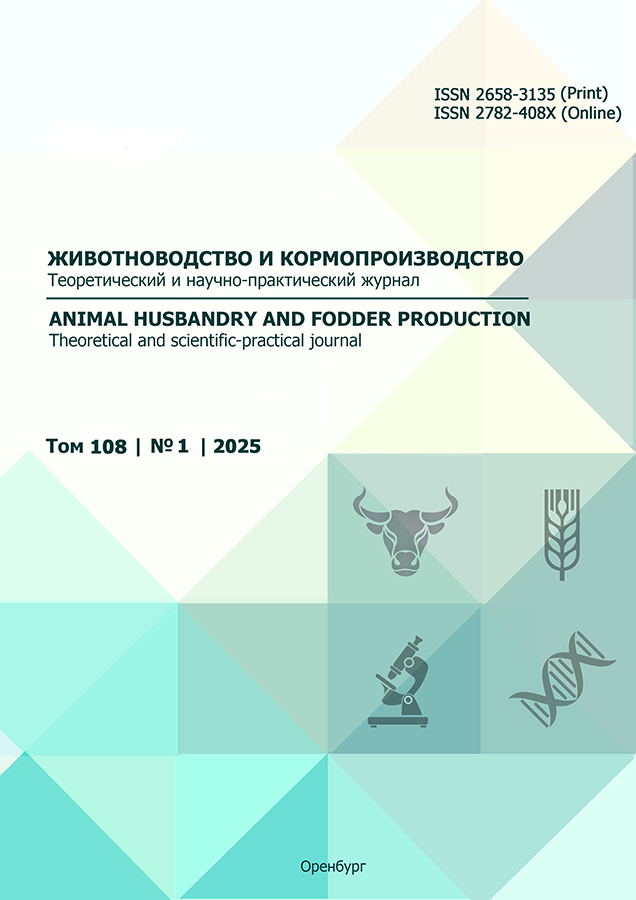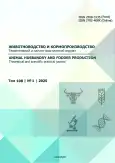Modification of metabolism and productivity of dairy cattle using the enzyme-probiotic feed additive Profort
- Authors: Afanasyeva A.I.1, Sarychev V.A.1
-
Affiliations:
- Altai State Agrarian University
- Issue: Vol 108, No 1 (2025)
- Pages: 115-127
- Section: Theory and practice of feeding
- URL: https://journal-vniispk.ru/2658-3135/article/view/290017
- DOI: https://doi.org/10.33284/2658-3135-108-1-115
- ID: 290017
Cite item
Full Text
Abstract
Modern methods of feeding dairy cattle, including year-round uniform feeding, are not always optimal for ruminants, which can lead to a decrease in the efficiency of nutrient absorption, especially with excessive intake of concentrated feeds, in which a large amount of lactic acid is formed in the rumen microbiome as a result of carbohydrate fermentation, which has a negative effect on the metabolism, structure and function of internal organs. One of the possible solutions to this problem in feeding highly productive cows is a targeted effect on the symbiotic microflora of the forestomachs by feeding probiotic preparations. In this regard, the aim of our research was to study the effect of the enzyme-probiotic feed additive Profort on the metabolic status, milk productivity and milk quality of lactating cows under conditions of year-round uniform feeding. Analysis of the milk productivity of cows after the first feeding (within 15 days) of Profort showed that the average daily milk yield in animals increased by 6.1%, compared with animals in the control group. Milk productivity of cows after repeated feeding of the preparation remained higher by 4.6 % than in the control animals. After the end of the experiment and the next feeding of the preparation, the difference in average daily milk yield was 1.9 kg (4.9%) in favor of the cows of the experimental group. Gross milk yield during the experiment in the experimental group was higher by 5.94%. The use of the enzyme-pobiotic feed additive Profort improves liver function in lactating cows. Total protein indicators increased by 1.46%, albumins - by 16.5% (P≤0.05), AST activity decreased by 15% (P≤0.05) and ALT - by 17.5%; the level of urea, triglycerides and cholesterol decreased by 11, 20 and 30.5%, respectively, which indicates an improvement in the metabolic state.
About the authors
Antonina I. Afanasyeva
Altai State Agrarian University
Author for correspondence.
Email: antonina59-09@mail.ru
ORCID iD: 0000-0002-6970-5987
Dr. Sci. (Biology), Professor, Head of the Department of General Biology, Biotechnology and Animal Breeding
Russian Federation, BarnaulVladislav A. Sarychev
Altai State Agrarian University
Email: Smy-asau@yandex.ru
ORCID iD: 0000-0003-4412-4366
Cand. Sci (Biology), Associate Professor of the Department of General Biology, Biotechnology and Animal Breeding
Russian Federation, BarnaulReferences
- Andreev VA, Stetsiouk OU, Andreeva IV. Probiotics: controversial issues. Clinical Microbiology and Antimicrobial Chemotherapy. 2022;24(4):345-360. doi: 10.36488/cmac.2022.4.345-360
- Anikin SV, Filatov AV, Shemuranova NA. Milk productivity and reproduction indicators when using the probiotic complex Profort Т. Zootechniya. 2023;3:16-18. doi: 10.25708/ZT.2023.15.68.004
- Barymova OP, Mikhalenchik TA. Influence of probiotic "Bacell" on milk productivity and milk quality. Bulletin of the Kursk State Agricultural Academy. 2023;6;115-118.
- Zaitsev VV, Seitov MS, Zaitseva LM, Emelyanova IS, Polikashina YuM Influence of biologically active additives on milk productivity of cows. Izvestia Orenburg State Agrarian University. 2022;2(94):288-292. doi: 10.37670/2073-0853-2022-94-2-288-292
- Tereshchenko VA, Ivanov YeA, Filipyev MM, Ivanova OV. Influence of feeding probiotics and bentonite clay on milk production and biochemical indices of cows. Bulletin of Altai State Agricultural University. 2017;8(154):117-124.
- State Standard 13928-84. Milk up milk and cream. Acceptance rules, methods of sampling and preparation of samples for testing. Implementation date 1986-01.01. Moscow: IPC Publishing House of Standards; 2003:6 р.
- State Standard 26809-86. Milk and milk products. Acceptance regulations, methods of sampling and preparation for testing. Implementation date 1987-01.01. Moscow: Standartinform; 2009:11 р.
- State Standard R 8.563-96. State system for ensuring the uniformity of measurements. Procedures of measurements. Implementation date 1997-07-01. Moscow: Gosstandart of Russia; 2010:23 р.
- Gruzdeva VV, Kaleev NV. The special role of dairy cattle, as an integral part of the agricultural sector and agriculture in the country’s economy. Bulletin NGIEI. 2017;8(75):80-89.
- Gulbet AE, Amerkhanov KhA, Solovyova OI. Quality of colostrum and milk from cows of different breeds when using Zoonorm probiotic. Animal Husbandry and Fodder Production. 2024;107(2):116-127. doi: 10.33284/2658-3135-107-2-116
- Duskaev GK, Levakhin GI, Korolev VL, Sirazetdinov FKh. Use of probiotics and plant extracts to improve the productivity of ruminants (review). Animal Husbandry and Fodder Production. 2019;102(1):136-148. doi: 10.33284/2658-3135-102-1-136
- Solodneva EV, Smolnikov RV, Bazhenov SA, Vorobyeva DA, Stolpovsky YuA. Lactation curves as a tool for monitoring the health and performance of dairy cows - a mini-review. Sel’skokhozyaistvennaya biologiya [Agricultural Biology]. 2022;57(2):257-271. doi: 10.15389/agrobiology.2022.2.257eng
- Nikulina NSh, Nikulin AF, Markova IV. The effectiveness of probiotic supplement biogumitel-g on milk productivity of black spotted cows. Animal Husbandry and Fodder Production. 2018;101(1):161-170.
- Kalashnikov AP, Fisinin VI, Shcheglov VV, Kleymenov NI ed. Norms and rations for feeding farm animals. Reference manual. 3rd edition revised and supplemented. Moscow; 2003:456 р.
- Ovsyannikov AI. Fundamentals of experimental work in animal husbandry: a teaching aid for universities. Moscow: Kolos; 1976:304 р.
- Yildirim EA, Laptev GYu, Dubrovina EG, Ilyina LA, Tyurina DG, Filippova VA, Dubrovin AV, Kalitkina KA, Sklyarov SP. Analysis results of cow rumen microflora composition under the probiotics influence by NGS sequencing method. Bulletin of KSAU. 2024;1(202):108-118. doi: 10.36718/1819-4036-2024-1-108-118
- Smirnova YuM, Platonov AB, Kotelevskaya VA. Effectiveness of probiotic Rumit in the dairy Ayrshire cattle diet. Agricultural Science Euro-North-East. 2023;24(3):468-477. doi: 10.30766/2072-9081.2023.24.3.468-477
- Smolencev SJu. Influence of probiotics on milk productivity of cows. Actual Questions of Improvement of Technology of Production and Processing of Agricultural Products. 2021;23:522-525.
- Tagirov KhKh, Khaziakhmetov FS, Andriyanova EM. The effect of the probiotic Kormozim-P on the intestinal microflora and hematological parameters of dairy calves. Animal Husbandry and Fodder Production. 2023;106(2):176-184. doi: 10.33284/2658-3135-106-2-176
- Tishenkov PI, Korvyakov AM. Effect of a lactobacillus-based probiotic on non-specific resistance, physiological state and growth energy of dairy calves. Zootechniya. 2020;11:13-17. doi: 10.25708/ZT.2020.60.56.004
- Izuddin WI, Loh TC, Samsudin AA, Foo HL, Humam AM, Shazali N. Effects of postbiotic supplementation on growth performance, ruminal fermentation and microbial profile, blood metabolite and GHR, IGF-1 and MCT-1 gene expression in post-weaning lambs. BMC Vet Res. 2019;15:315. doi: 10.1186/s12917-019-2064-9
- Ma ZZ, Cheng YY, Wang SQ, Ge JZ, Shi HP, Kou JC. Positive effects of dietary supplementation of three probiotics on milk yield, milk composition and intestinal flora in Sannan dairy goats varied in kind of probiotics. J Anim Physiol Anim Nutr. 2020;104(1):44-55. doi: 10.1111/jpn.13226
- Moallem U, Lehrer H, Livshitz L, Zachut M, Yakoby S. The effects of live yeast supplementation to dairy cows during the hot season on production, feed efficiency, and digestibility. J Dairy Sci. 2009;92(1):343-351. doi: 10.3168/jds.2007-0839
- Peng H, Wang JQ, Kang HY, Dong SH, Sun P, Bu DP, et al. Effect of feeding Bacillus subtilis natto fermentation product on milk production and composition, blood metabolites and rumen fermentation in early lactation dairy cows. J Anim Physiol Anim Nutr. 2012;96(3):506-512. doi: 10.1111/j.1439-0396.2011.01173.x
- So S, Wanapat M, Cherdthong A. Effect of sugarcane bagasse as industrial by-products treated with Lactobacillus casei TH14, cellulase and molasses on feed utilization, ruminal ecology and milk production of mid-lactating Holstein Friesian cows. J Sci Food Agric. 2021;101(11):4481-4489. doi: 10.1002/jsfa.11087
- Sun X, Wang Y, Wang E, Zhang S, Wang Q, Zhang Y, et al. Effects of Saccharomyces cerevisiae culture on ruminal fermentation, blood metabolism, and performance of high-yield dairy cows. Animals. 2021;11(8):2401. doi: 10.3390/ani11082401
- Xie Y, Wu Z, Wang D, Liu J. Nitrogen partitioning and microbial protein synthesis in lactating dairy cows with different phenotypic residual feed intake. J Anim Sci Biotechnol. 2019;10:54. doi: 10.1186/s40104-019-0356-3
Supplementary files











